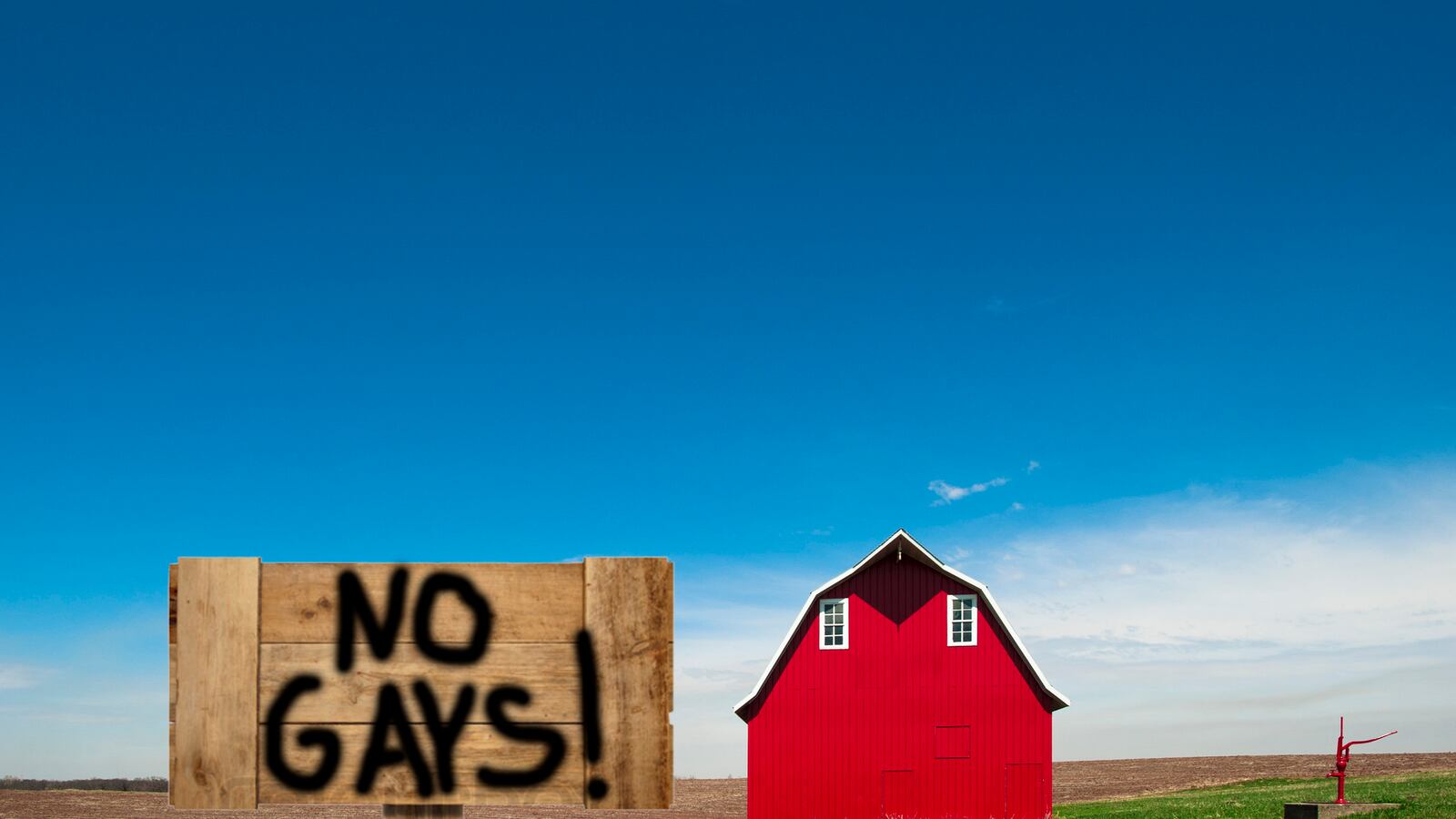As is only to be expected, a fresh wave of controversy is swirling around a court’s imposition of massive fines on two New York farmers who don’t want a gay couple to get married on their property.
In today’s news cycle, where outrage is instinctively deployed as a weapon against our memory, the story of the Giffords (who owned the farm) versus the McCarthys (who wanted to get married there) may become little more than a fleeting blip on our frantic radar. But it is worth more than an ounce of attention, because it offers a glimpse at an inhuman future where celebration is enforced by law and punished with arbitrary takings.
It takes an effort to think beyond the clear culture-war confines of the case. Some of us will be outraged that the Giffords rescinded their implicit invitation to the McCarthys because, as court papers document, they said their “specific religious belief regarding marriage” created “a little bit of a problem.”
Others among us will freak at the fact that the Giffords were dragged to court—wherein administrative judge Migdalia Pares decided that the McCarthys suffered “mental anguish” worth exactly $3,000 of the Giffords’ money.
Perhaps more than a few of us will flip their lids on account of Judge Pares’ further judgment that the Giffords were so awful that only 10,000 more of their dollars could rebalance the scales of justice.
Now that we have gotten over these multifarious horribles, we are obliged to ponder the bigger picture.
We know that the march of gay marriage has been embraced so swiftly because Americans readily grasped the libertarian and individualist benefits of loosening and abstracting the concept of marriage one logical step beyond its heterosexual bounds.
We are now learning that gay marriage, like everything else, becomes hideously more complex and messy when it goes from ideological concept to political execution. Rather than a cut-and-dried application of a clean rational rule, the “implementation” of gay marriage demands that government routinely intervene in the most intimate and idiosyncratic details of our lives, our property, and our conscience.
We are now getting up close and personal with the uncanny and portentous irony of the government extracting cash from the owners and residents of a place called Liberty Ridge Farm.
It may be easy for some of us to insist that the farm is, as Judge Pares determined, a so-called “place of public accommodation,” the “access” to which the McCarthys were entitled. For those of us fully aware of the endemic attorney-ism of our times, however, these kinds of terms, and the rationale behind them, appear far more plastic than the rationalists would care to admit.
To dwell on that for a moment is to get a sharp taste of the overarching issue that Liberty Ridge raises for us. We have a constitutional problem on our hands—one much bigger than gay marriage, the First Amendment, or even religion itself. The more we tie ourselves in knots over the official and unofficial status of homosexuality, the harder it is to realize. But realize we must.
Here’s how the problem works. The Constitution is “biased” in two distinctive, important ways. Although at first blush they may seem obvious, the implications of these biases have not been fully unconcealed until very recently.
To begin with, the First Amendment is flagrantly biased in favor of religion. As we all know, it requires Congress not to make any law “prohibiting the free exercise thereof.” What this means in practice is profound: If the beliefs you are exercising are not religious, your freedom to exercise them is not as protected by the Constitution as religious beliefs. If you like to trip on peyote because it is fun for you, or because you believe it makes you a better person, you will not receive the same legal protection as someone who trips on peyote because it is an integral part of long-standing religious beliefs to which they subscribe.
For irreligious people, this is a potential outrage of the first order. How dare the government extend special protections to religions for no better reason than that they are religions?
But for civil libertarians, whatever their degree of faith, there is cause for anxiety as well. The First Amendment implicitly requires government itself to make official determinations about what is and what isn’t a religion. No matter how necessary that may be to our constitutional framework, there is always a possibility for abuse, and in times of intense culture war, that possibility is magnified.
Unfortunately, the problem is even worse than that. The First Amendment is also biased against religion in an unexpected way. As we are all familiar, Congress “shall make no law respecting an establishment of religion.” Sorry, theocrats! But think more deeply: Congress could make all kinds of laws that aggressively establish an ideology that is not a religion.
To underscore the point: The Constitution strongly protects us against theocrats who would pass religious precepts into law. The Constitution provides us with pretty much no protection against ideologues who want to hardwire specific secular dogmas into our laws and our lives—so long as the attorneys defending this process in court convince judges that due process and equal protection standards are met.
You may or may not believe that the current advance of gay marriage is, generally speaking, the advance of a secular ideology. Evidence on that score is mixed. Fortunately, your judgment on that score isn’t dispositive when it comes to grappling with our constitutional crisis. At stake is an ideology far more expansive than support for same-sex couples.
Consider the triumphant words of Donna Lieberman, the executive director of the NYCLU: “Marriage should be a time of celebration, not discrimination.” This vision, in the context of the incident at Liberty Ridge, reveals a substantial weakness in our constitutional framework. A secular creed that places a right to celebration at the center of our humanity cannot be constitutionally circumscribed in the same way that a religious dogma can be.
In an era of enforced celebration, individuals lose control over who they can let party on their property. That should immediately destroy any illusions about how “libertarian” the Liberty Ridge ruling might be. Once individuals are conscripted into others’ celebrations, the state gains the control those individuals lose. Government enforcers must be on call to police “access” to property.
Can we find a way to prevent invidious discrimination without subjecting ourselves to government-enforced ideologies? After all, they are apt to be every bit as powerful, invasive, and destructive as the theocratic creeds the First Amendment was created to shield us from.
Alas, according to the constitution, established government doctrines about “good” celebrations can be enforced, but freely exercised religious beliefs must also be protected. The Founders didn’t imagine that our cultural divisions could get so deep that the First Amendment contained the seeds of its own contradiction.
So, the ball is in our court. The more blindly we hate discrimination, and the more blindly we love celebration, the more we will be tempted to accept equality in servitude to enforced ideologies—and simply hope that the “right” people maintain power forever. America may be able to survive that collective indignity, but the First Amendment is not.





